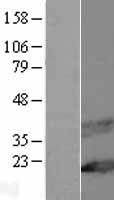MAL (NM_002371) Human Tagged ORF Clone
CAT#: RC201256
MAL (Myc-DDK-tagged)-Human mal, T-cell differentiation protein (MAL), transcript variant a
ORF Plasmid: tGFP
"NM_002371" in other vectors (6)
Need custom modification / cloning service?
Get a free quote
CNY 1,200.00
CNY 3,705.00
CNY 300.00
Specifications
| Product Data | |
| Type | Human Tagged ORF Clone |
| Tag | Myc-DDK |
| Synonyms | MVP17; VIP17 |
| Vector | pCMV6-Entry |
| E. coli Selection | Kanamycin (25 ug/mL) |
| Mammalian Cell Selection | Neomycin |
| Sequence Data |
>RC201256 ORF sequence
Red=Cloning site Blue=ORF Green=Tags(s) TTTTGTAATACGACTCACTATAGGGCGGCCGGGAATTCGTCGACTGGATCCGGTACCGAGGAGATCTGCC GCCGCGATCGCC ATGGCCCCCGCAGCGGCGACGGGGGGCAGCACCCTGCCCAGTGGCTTCTCGGTCTTCACCACCTTGCCCG ACTTGCTCTTCATCTTTGAGTTTATCTTCGGGGGCCTGGTGTGGATCCTGGTGGCCTCCTCCCTGGTGCC CTGGCCCCTGGTCCAGGGCTGGGTGATGTTCGTGTCTGTGTTCTGCTTCGTGGCCACCACCACCTTGATC ATCCTGTACATAATTGGAGCCCACGGTGGAGAGACTTCCTGGGTCACCTTGGACGCAGCCTACCACTGCA CCGCTGCCCTCTTTTACCTCAGCGCCTCAGTCCTGGAGGCCCTGGCCACCATCACGATGCAAGACGGCTT CACCTACAGGCACTACCATGAAAACATTGCTGCCGTGGTGTTCTCCTACATAGCCACTCTGCTCTACGTG GTCCATGCGGTGTTCTCTTTAATCAGATGGAAGTCTTCA ACGCGTACGCGGCCGCTCGAGCAGAAACTCATCTCAGAAGAGGATCTGGCAGCAAATGATATCCTGGATT ACAAGGATGACGACGATAAGGTTTAA >RC201256 protein sequence
Red=Cloning site Green=Tags(s) MAPAAATGGSTLPSGFSVFTTLPDLLFIFEFIFGGLVWILVASSLVPWPLVQGWVMFVSVFCFVATTTLI ILYIIGAHGGETSWVTLDAAYHCTAALFYLSASVLEALATITMQDGFTYRHYHENIAAVVFSYIATLLYV VHAVFSLIRWKSS TRTRPLEQKLISEEDLAANDILDYKDDDDKV |
| Chromatograms |
CHROMATOGRAMS
 Sequencher program is needed, download here. |
| Restriction Sites |
SgfI-MluI
Cloning Scheme for this gene
Plasmid Map

|
| ACCN | NM_002371 |
| ORF Size | 459 bp |
| OTI Disclaimer | The molecular sequence of this clone aligns with the gene accession number as a point of reference only. However, individual transcript sequences of the same gene can differ through naturally occurring variations (e.g. polymorphisms), each with its own valid existence. This clone is substantially in agreement with the reference, but a complete review of all prevailing variants is recommended prior to use. More info |
| OTI Annotation | This clone was engineered to express the complete ORF with an expression tag. Expression varies depending on the nature of the gene. |
| Product Components | The ORF clone is ion-exchange column purified and shipped in a 2D barcoded Matrix tube containing 10ug of transfection-ready, dried plasmid DNA (reconstitute with 100 ul of water). |
| Reconstitution | 1. Centrifuge at 5,000xg for 5min. 2. Carefully open the tube and add 100ul of sterile water to dissolve the DNA. 3. Close the tube and incubate for 10 minutes at room temperature. 4. Briefly vortex the tube and then do a quick spin (less than 5000xg) to concentrate the liquid at the bottom. 5. Store the suspended plasmid at -20°C. The DNA is stable for at least one year from date of shipping when stored at -20°C. |
| Reference Data | |
| RefSeq | NM_002371.4 |
| RefSeq Size | 1153 bp |
| RefSeq ORF | 462 bp |
| Locus ID | 4118 |
| UniProt ID | P21145 |
| Protein Families | Transmembrane |
| MW | 16.7 kDa |
| Gene Summary | The protein encoded by this gene is a highly hydrophobic integral membrane protein belonging to the MAL family of proteolipids. The protein has been localized to the endoplasmic reticulum of T-cells and is a candidate linker protein in T-cell signal transduction. In addition, this proteolipid is localized in compact myelin of cells in the nervous system and has been implicated in myelin biogenesis and/or function. The protein plays a role in the formation, stabilization and maintenance of glycosphingolipid-enriched membrane microdomains. Down-regulation of this gene has been associated with a variety of human epithelial malignancies. Alternative splicing produces four transcript variants which vary from each other by the presence or absence of alternatively spliced exons 2 and 3. [provided by RefSeq, May 2012] |
Documents
| Product Manuals |
| FAQs |
| SDS |
Resources
Other Versions
| SKU | Description | Size | Price |
|---|---|---|---|
| RC201256L1 | Lenti ORF clone of Human mal, T-cell differentiation protein (MAL), transcript variant a, Myc-DDK-tagged |
CNY 3,600.00 |
|
| RC201256L2 | Lenti ORF clone of Human mal, T-cell differentiation protein (MAL), transcript variant a, mGFP tagged |
CNY 5,890.00 |
|
| RC201256L3 | Lenti ORF clone of Human mal, T-cell differentiation protein (MAL), transcript variant a, Myc-DDK-tagged |
CNY 3,600.00 |
|
| RC201256L4 | Lenti ORF clone of Human mal, T-cell differentiation protein (MAL), transcript variant a, mGFP tagged |
CNY 5,890.00 |
|
| RG201256 | MAL (tGFP-tagged) - Human mal, T-cell differentiation protein (MAL), transcript variant a |
CNY 2,800.00 |
|
| SC118699 | MAL (untagged)-Human mal, T-cell differentiation protein (MAL), transcript variant a |
CNY 1,200.00 |


 United States
United States
 Germany
Germany
 Japan
Japan
 United Kingdom
United Kingdom
 China
China




